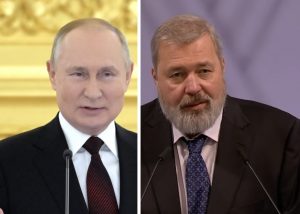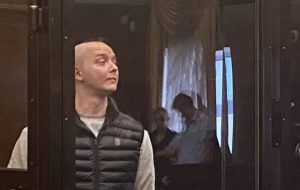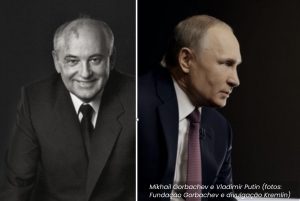London – In addition to intensifying the persecution of journalists and independent media outlets after the war with Ukraine began, the Russian government has now managed to extinguish the Association of Journalists and Media Professionals (JMWU).
This Wednesday (14), the Moscow Court upheld a case brought by the Public Ministry and ordered the dissolution of the affiliate to the International and European Federations of Journalists (IFJ and EFJ).
In a joint note, both denounced “the illegitimate political case based on false accusations.” The union’s activities have already been suspended by the government since July.
Persecution of the press in Russia began before the war
The IFJ is the world’s largest journalistic association, bringing together trade unions and professional associations in 140 countries. It is represented in Brazil by the Fenaj (National Federation of Journalists).
Founded in Russia’s North Caucasus following an attack on domestic and foreign journalists in 2016, the union has nearly 600 active members and advocates for workers’ rights, provides assistance to journalists, and supports press freedom in Russia.
This does not please the government. The crackdown on independent journalism in Russia, a hallmark of the regime, worsened in 2021. Even Russian journalist Dmitry Muratov’s Nobel Peace Prize did not serve to ease the pressures.
The fact that journalists and media outlets began to be listed as “foreign agents” made it difficult to finance their editorial work and activities. Correspondents were expelled for bureaucratic reasons or their visas were not renewed.
Also Read | Russia is exacerbating its press crisis by expelling another foreign correspondent, this time from a Dutch newspaper.
Shortly after the invasion, the government passed a “fake news” law that punished anyone who spread “false information” about the so-called “special operation” with up to 15 years, as required by the war. wanted.
The fear drove media professionals into exile and resulted in the suspension or severe limitation of international media coverage from Russia.
Convictions of press professionals follow one another. The Nobel Peace Prize newspaper lost its license to operate in 2006, accused of failing to comply with a bureaucratic formality.
Also Read | Newspaper and magazine with Nobel Peace Prize lose media record in Russia
Union’s closure
The union’s activities have already been suspended since July, when prosecutors accused it of publishing “materials containing misleading information” about Russia’s war in Ukraine.
The union was also fined 500,000 rubles in August for allegedly discrediting the Russian military in response to posts about the war on the union’s website.
According to the International Federation of Journalists, the Prosecutor General of Russia, in the decision to close the union, claimed that the members did not pay dues and participated in “unauthorized acts”. One of them supported Russian journalist Ivan Safronov, who was recently sentenced to 22 years in prison for alleged treason.
Also Read | Russian defense reporter who refused to sign the confession sentenced to 22 years in prison for ‘treason’
After the conviction, the Russian government began persecuting other professionals who sided with Safranov, according to Reporters Without Borders, and conducted search and seizure operations in the homes of many of them.
The Russian prosecutor also said the union was raising money to support media outlets labeled as foreign agents and “systematically” distributing banned content.
JMWU’s lawyer disputed all charges, calling them illegal and unsubstantiated. “However, the judge only considered the prosecutor’s baseless allegations,” the IFJ said.
“This court decision will have no impact on our subsidiaries, who will continue to fulfill their journalistic mission by continuing to tell the truth about the situation in Russia. “The Russian judiciary is mistaken if it thinks it ends our professional commitment to serving the people,” said WMWU Secretary Andrei Jvirblis.
For the IFJ and EFJ general secretaries, Anthony Bellanger and Ricardo Gutiérrez, this is a political case “only to scare independent journalists and prevent them from uniting to expose the multiple and increasing press freedom violations in Russia.”
“This conviction is a fraud of justice and as such we continue to view the JMWU as a representative and reliable unit in Russia.
JMWU remains a member of the IFJ and EFJ and we will provide all necessary support for the continuity of their activities”.
CPJ also touched on the persecution of journalism and said in a statement, “With the closure of the Association of Journalists and Media Professionals, Russia has destroyed one of the last institutions in the country to protect press freedom and defend journalists.”
“Russia has given a clear signal of its intention to ban independent journalism permanently,” said Carlos Martínez de la Serna, CPJ’s program director in New York.
Andrei Jvirblis stated that the institution will appeal the decision.
Also Read | Analysis | Gorbachev’s Glasnost gave Russia freedom of the press, but Putin took it back
source: Noticias



